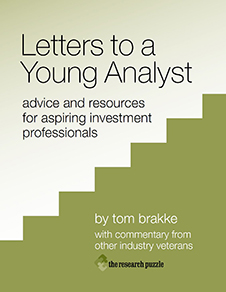
- Thursday, April 26th, 2012
- to infinity and beyond
-
Last Saturday, there was an article in the Wall Street Journal entitled, “Time to Cut Back on Apple?”Wall Street Journal | This is the article, which as of the time of my writing was not behind the Journal’s paywall. Given the explosive rebound in Apple’s share price in response to its earnings release, a commenter after the fact responded simply, “Answer: NO.”
Apple has become the largest stock in the S&P 500 due to its sharp move higher (it’s up more than 50% so far this year alone). The normal decision making process can become distorted when that occurs; I was quoted in the article to that effect.
Jeremy Grantham has written persuasively that institutional “investment behavior is driven by career risk.”GMO | That quote is from the first sentence of his April 2012 quarterly letter. Investments are made not just on their merits, but in comparison to the crowd of investors against which you compete and the benchmark against which you are measured.
Therefore, as an investment manager, what should you do with Apple? It has an outsized impact on your benchmark due to its size — and it has been on a tear. Do you overweight it or underweight it or hug its index weight? That decision will likely be the biggest single driver of your relative performance. If you don’t think that matters to the person making buy and sell decisions, you haven’t sat in that chair.
But it’s not just relative weighting. Imagine going to a road show where you sit with portfolio managers from other firms. “How much Apple do you own?” is likely to be a question from one of them before long. What do you say? What do you want to say?
How about visiting a pension plan for a quarterly review meeting, with numbers that lag the index because you don’t have any Apple? Where do you think that conversation is going to go?
Or let’s say that you are in a large investment firm and were the one person who took an early and outsized position in the stock. How has your success altered the way you interact with others, when your every move with the stock is scrutinized? If you have become known as “the Apple guy,” how will your decision making about it change?
Recently, a sell-side analyst downgraded Apple to a “hold” (not exactly a bearish call). In his report he pledged allegiance to the company and its products — and practically apologized for his action. He was still ripped by believers.
There are times when a money manager that trims a stock as a part of her risk management discipline might wish that it would go down for awhile to show her colleagues it was a good move, despite the fact that with a still-large position she should be hoping it goes to infinity. Every decision is magnified, every emotion is amplified. It can all become more behavioral than analytical.
These are the dynamics that build and compound and embed when you have such an unusual (but not unprecedented) situation. You also get managers straying from their stated mandates to try to capture some of the performance magic. The small cap and emerging markets specialists that own Apple are a long way from their stated expertise. Often the value versus growth dimension comes into play too, although Apple is a special case in that respect because it can be seen as both (which adds to its narrative power).
There are many other ways that decision processes are altered at the institutional level under these circumstances and it occurs with individuals too, even though they don’t face the career risk component that money managers do. Collectively, the inflections in behavior can swamp the fundamental developments at the company, sometimes in unexpected ways.
In the Journal article, a money manager who has close to twenty percent of his fund in Apple was quoted as saying that it would be “more risky not to have a heavy position.” Whether that’s your view or the conceptual opposite, now may be a good time to deconstruct your expectations and to understand the unique challenges that you face.
